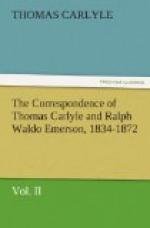the nationalities of the world, the battle for Humanity
is, at this hour, in America. A few days here
would show you the disgusting composition of the Party
which within the Union resists the national action.
Take from it the wild Irish element, imported in
the last twenty-five year’s into this country,
and led by Romish Priests, who sympathize, of course,
with despotism, and you would bereave it of all its
numerical strength. A man intelligent and virtuous
is not to be found on that side. Ah! how gladly
I would enlist you, with your thunderbolt, on our
part! How gladly enlist the wise, thoughtful,
efficient pens and voices of England! We want
England and Europe to hold our people stanch to their
best tendency. Are English of this day incapable
of a great sentiment? Can they not leave caviling
at petty failures, and bad manners, and at the dunce
part (always the largest part in human affairs), and
leap to the suggestions and finger-pointings of the
gods, which, above the understanding, feed the hopes
and guide the wills of men? This war has been
conducted over the heads of all the actors in it;
and the foolish terrors, “What shall we do
with the negro?” “The entire black population
is coming North to be fed,” &c., have strangely
ended in the fact that the black refuses to leave
his climate; gets his living and the living of his
employers there, as he has always done; is the natural
ally and soldier of the Republic, in that climate;
now takes the place of two hundred thousand white
soldiers; and will be, as the conquest of the country
proceeds, its garrison, till peace, without slavery,
returns. Slaveholders in London have filled
English ears with their wishes and perhaps beliefs;
and our people, generals, and politicians have carried
the like, at first, to the war, until corrected by
irresistible experience. I shall always respect
War hereafter. The cost of life, the dreary
havoc of comfort and time, are overpaid by the vistas
it opens of Eternal Life, Eternal Law, reconstructing
and uplifting Society, —breaks up the old
horizon, and we see through the rifts a wider.
The dismal Malthus, the dismal DeBow, have had their
night.
Our Census of 1860, and the War, are poems, which
will, in the next age, inspire a genius like your
own. I hate to write you a newspaper, but, in
these times, ’t is wonderful what sublime lessons
I have once and again read on the Bulletin-boards in
the streets. Everybody has been wrong in his
guess, except good women, who never despair of an
Ideal right.
I thank you for sending to me so gracious a gentleman
as Mr. Stanley, who interested us in every manner,
by his elegance, his accurate information of that
we wished to know, and his surprising acquaintance
with the camp and military politics on our frontier.
I regretted that I could see him so little.
He has used his time to the best purpose, and I should
gladly have learned all his adventures from so competent
a witness. Forgive this long writing, and keep
the old kindness which I prize above words.
My kindest salutations to the dear invalid!




